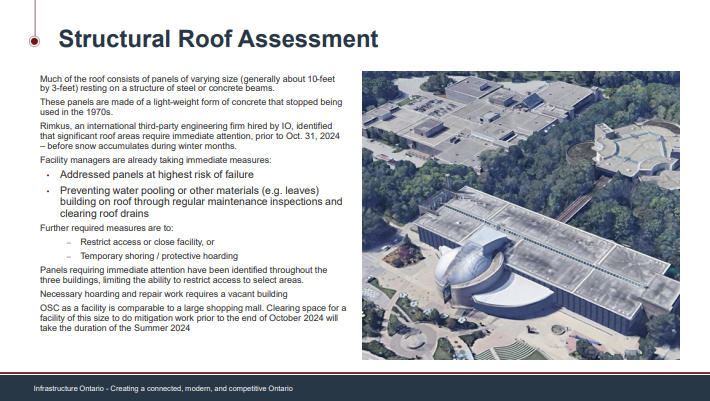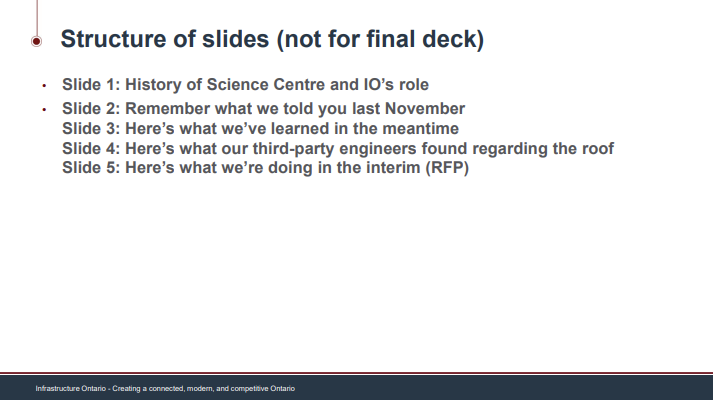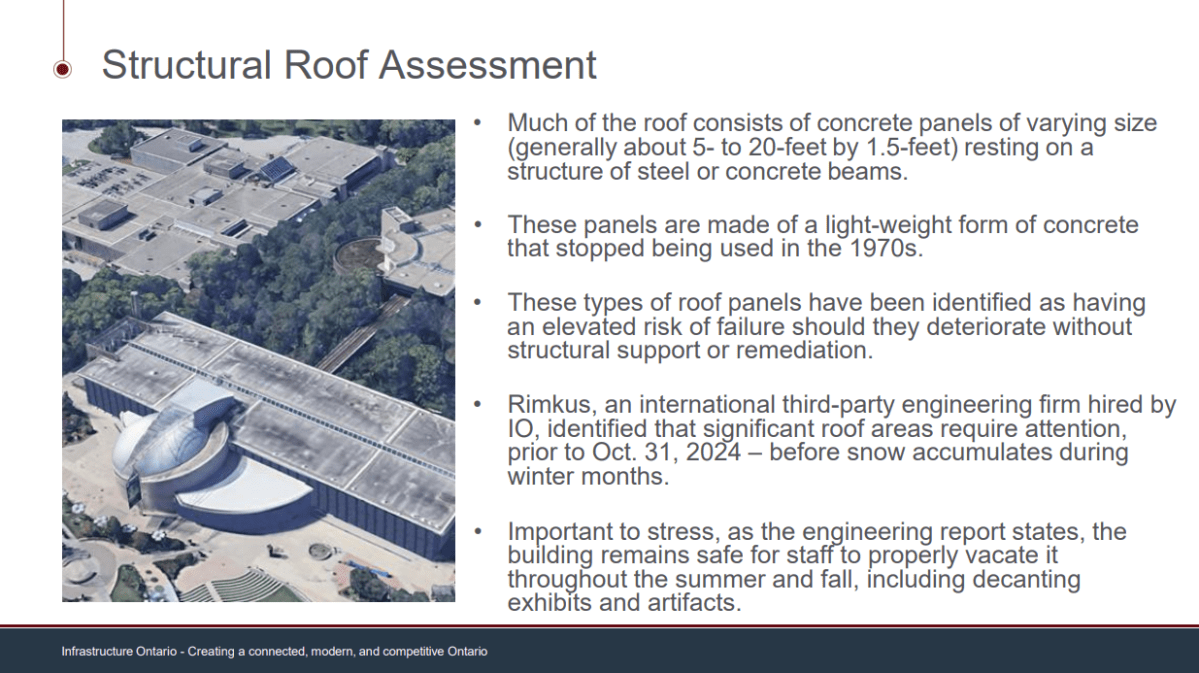Key details of an engineering report that led to the permanent closure of the Ontario Science Centre were known and actively discussed by senior staff at Infrastructure Ontario (IO) eight days before the findings were presented to the attraction’s board of directors, Global News has learned, something the Crown corporation says is standard practice.

Internal texts and emails, obtained using freedom of information laws, show staff had conversations about details in the report and its recommendations, including when the attraction would have to be vacated, before it was submitted.
Text messages also suggest executives at Infrastructure Ontario were in direct contact with figures at Rimkus while they were working on the expert report, raising questions about what role the government’s Crown agency played in shaping the final product.
Infrastructure Ontario, however, said the move is a standard practice in finalizing an independent expert report.
“Following normal industry processes, IO worked with Rimkus to ensure that the final report captured the relevant information that was required to present to government and the Ontario Science Centre Board of Trustees in order for them to have all the facts necessary to make an informed decision,” a spokesperson said.
The Ford government also underscored that the report was “written solely by Rimkus” and that no one else had input on how it was completed.
“Non-partisan Ministry of Infrastructure officials were kept informed by Infrastructure Ontario (IO) of safety concerns of the Ontario Science Centre (OSC) facility and potential outcomes prior to the final Rimkus report,” the premier’s office said.
“The Rimkus report was also reviewed by an independent third party engineering firm who validated that the data presented in the report was sound. No non-partisan MOI officials, nor minister’s staff, nor Premier’s office staff were part of the discussion in the writing of the final report.”

Critics at Queen’s Park charged that the decision to close the science centre was baked in, even before final advice was given.
“Here we have just another example of how this government was making a decision before there was any actual rationale,” Ontario NDP Leader Marit Stiles said on Wednesday.
The government remains adamant the process to close the science centre in June of this year flowed as quickly as it could and was guided by safety concerns — pointing to the fact the minister was only briefed after the final report was submitted as evidence no premature calls had been made.
“The final decision to close the Ontario Science Centre to the public was made by the Ontario Science Centre board at their meeting on June 20th,” the premier’s office said.
“It was agreed that the facility would be closed to the public effectively by end of day June 21st.”
Details of the report
On June 12, nine days before the closure, Infrastructure Ontario staff began sharing high-level details of the Rimkus report in order to ensure “consistency” with the communications plan.
Officials were well aware that “the condition of roof panels above the Great Hall and elsewhere require closure by Oct. 31” and that the building faced other operational challenges including heating and the pedestrian bridge.
“Adding all of those details together, the government has made a decision out of an abundance of caution to close to the public before summer,” the internal email read.
Text messages between Infrastructure Ontario CEO Michael Lindsay and the agency’s top communications staffer appear to suggest the agency was in contact with Rimkus about its expert report before it was submitted.

Get breaking National news
One text, sent before the final report was finished, referenced Lindsay having seen “executives at Rimkus,” suggesting the two sides had been in communication.
Then, when the final report was sent, a member of the Rimkus team also seemed to reference conversations that had taken place.
“Please refer to revised final summary report (R2) attached, with updated notes/paragraphs, as discussed,” they wrote on June 18.

Infrastructure Ontario did not directly address questions from Global News about if it had seen an early version of the report but documents show officials knew enough to create a detailed slide deck on June 14 that was almost identical to the final briefing given to the board of directors.
The premier’s office said the report followed the “conventional process” within government and news products were created based on potential outcomes.
“Non-partisan officials try to anticipate the needs of the Minister and staff prior to presenting information, including preparing products and considering potential responses,” a spokesperson said.
A slide on the roof condition written before the final report was submitted:

A slide on the roof condition presented in the final June 21 briefing:
Ministry helps shape plan
Internal communications that were sent as part of the drafting of the briefing deck also acknowledged the government would get the ultimate say on how the move was presented.
“I hesitate to ask that you go into edit/rewrite mode yet because I suspect there will be considerable edits once this goes through the ministry approvals blender,” one email said on June 17, three days before it was presented to the board of directors.
The next day, an email from the government to Infrastructure Ontario suggested it had not done enough to drive home the key message about the roof.
“Roof Structure Slide — it’s not clear that the slide on the Roof Structure is hitting the mark,” they wrote on June 18.
“Reporters need to walk away with a very clear understanding of what the problem is, what has been done, and what the engineering recommendation is.”
Text messages to Lindsay also reference PO — shorthand for the premier’s office — helping with the communications strategy.
“I spoke with PO today and if the summary says the right things to highlight, then they might avoid having a tech briefing,” a text received by Lindsay from his communications chief on the day the report was submitted said.
Timeline:
- June 11: Draft media products are sent by the government to Infrastructure Ontario for review.
- June 14: A version of the news release says out of an “abundance of caution, effective today” Ontario Science Centre will close.
- June 17: A plan put in place to begin fencing off Ontario Science Centre is approved.
- June 18: The Rimkus engineering report is officially submitted to Infrastructure Ontario.
- June 19: Minister of Infrastructure Kinga Surma formally briefed on the closure plan. A dry run of tech briefing is also organized.
- June 20: The Ontario Science Centre board is briefed on the engineering report. It votes unanimously in favour of closure.
- June 21: Ontario Science Centre closure announced. Hours later, the building is shuttered.
Ontario Liberal MPP Adil Shamji, who represents the riding where the science centre is located, said the communications suggested the decision to close the science centre over the state of its roof was made long before it was announced.
“It speaks to something that we’ve actually already suspected — that the abrupt closure of the Ontario Science Centre was premeditated,” he said.
“It was predetermined that this government did not want to see the Ontario Science Centre continue in the place that it occupies right now. They spent a week, or quite possibly longer, establishing a communications, crisis management plan that could give them the opportunity to say that they had no choice whatsoever in shutting it down.”
Minister briefed after news release drafted
The documents also show that, while Minister Kinga Surma was not briefed until two days before the decision, staff were working on an official response to attribute to her well before.
A draft news release, shared internally on June 14, includes a quote to be attributed to Surma, explaining a closure that she had apparently not yet been briefed on.
“Based on new information from Rimkus Consulting Group, and the findings from the Ontario Science Centre business case, the difficult decision has been made to close the current facility to members of the public and allow for the decant of the facility over the coming months,” Surma said in the draft news release.
“At the same time, we are taking steps to ensure Ontarians can continue to benefit from the Science Centre’s important programs and experiences in new ways.”
The quote was ultimately not used and Surma herself was briefed early on June 19, according to both the premier’s office and the internal emails.

During question period on Wednesday, Progressive Conservative House Leader Steve Clark said the decision to close the Ontario Science Centre was made by the board of directors at the science centre, not the government.
“The decision to close the science centre came by the board of directors itself,” Clark said, also referencing the Rimkus report.
“The opposition would be the first ones to howl and howl and howl that this board ignored the report. The board did not ignore the report and the government did not ignore the report.”
Minutes of science centre board meetings also obtained by Global News, however, show the board found out about the plan to close the attraction after work had begun.
After Surma was briefed on the science centre closure plan on June 19, an email was sent to board members informing them an “emergency virtual board meeting” was being convened for the next day.
“Please make every effort to attend and confirm your availability,” an email to board members said. “I apologize for the late notice and appreciate your patience as we address the many moving parts.”
The board did not vote to close the science centre until June 20, the day before the announcement was made. By then, a contract was in place to fence off the building, the minister had been briefed on the plan and a slew of communications materials had been written.
“It clearly wasn’t urgent to shut down the science centre — otherwise the government would have acted with urgency,” Ontario Green Party Leader Mike Schreiner said.
“And that confirms what architects and engineers have told us, that the science centre did not need to be immediately shut down. And the premier’s only reason for doing it was politically motivated.”








Comments